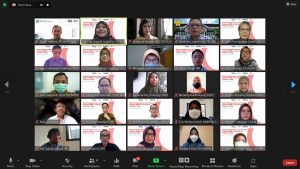
The representative of life science laboratory and work unit related to biosafety and biosecurity
The COVID-19 pandemic and other diseases have been increasing the threat of biological elements in our surroundings. Currently, health personnel are dealing more intensely with deadly infectious pathogens, particularly in the laboratory. The hazard of biological materials is not only harmful to the environment, but also to the laboratory staff, if these laboratory activities are not handled appropriately in line with biosafety and biosecurity laws. The methods, facilities, and equipment are required to manage these biological agents in order to manage proper biosafety and biosecurity. Furthermore, increasing the capability of Human Resources, regulations, and laboratory management guidelines are also crucial. The laboratory activities should be protected from the biological agent exposures. In this case, the top management has a high authority to facilitate those things as well.
COVID-19 samples are currently handled by laboratories that are not just government-run national-level facilities, but also laboratories owned by universities. INDOHUN, through the OHLN program, encourages and supports the implementation of Laboratory Biorisk Management System (LBMS) policy in university laboratories. This action was taken as part of the initiation of national policy development that related to the Laboratory Networking and Implementation of Laboratory Biorisk Management Systems. It is taken by considering the SNI ISO 35001 standard, which was established by the National Standardization Agency in 2019, so it can be adapted to the existing laboratory situation.
Hence, INDOHUN-OHLN, as a One Health laboratory network, took the initiative to hold an LBMS Policy and Organization Meeting in the University Laboratory on Monday, February 21, 2022. The event was carried out in the context of conveying the urgency of LMBS policy, advocating for the implementation of LMBS policy, and discussing the strategic plans for implementing LMBS policy in the institutions.
This event invites 11 representative institutions, including :
- Office of Risk Management and Work Environment Protection, IPB University
- Education and Service Laboratory, Faculty of Veterinary Medicine, IPB University
- Leading Research Laboratory Unit, IPB University
- Center for Primate Studies (PSSP), IPB University
- IPB Culture Collection, Faculty of Mathematics and Natural Sciences, IPB University
- Virology and Cancer Pathobiology Research Center Laboratory (PRVKP), Faculty of Medicine, University of Indonesia.
- Laboratory of the Special Work Unit for the Microbiology Laboratory (UKK LMK), Faculty of Medicine, University of Indonesia.
- Stem Cell and Tissue Engineering Laboratory, IMERI, Faculty of Medicine, University of Indonesia.
- Microbiology Laboratory of FK-KMK – Gadjah Mada University
- Infectious Disease Laboratory, Faculty of Medicine, Syiah Kuala University
- Clinical Microbiology Laboratory, Airlangga University Hospital
Prof. Faisal Fathani (Plt. Director of Research and Technology & Community Service, Directorate General of Higher Education, Research and Technology – Ministry of Education and Culture, Research and Technology RI) and Wahyuni Kamah (Biosecurity Engagement Program Indonesia) were also invited to participate in this event. There are two agendas for this meeting: material sessions and discussion sessions. The first speaker is Agus Setiawan, MPH’s “Explanation of Biorisk Management Program Activities” (Program Manager of OHLN). Then, followed by the first discussion session, “Laboratory Capacity Mapping Results, Laboratory Capacity Assessment Plan, and Laboratory Assessment Tools (LAT) Explanation.”
Hereinafter, the agenda continues with “SNI ISO 35001 Introduction by Dr. drh. Diah Iskandriati, IFBA PC and the second discussion session regarding “Plans and Patterns Assistance: ISO SNI 35001 Certification, Updating of the development/LBMS policy optimization/Rector’s regulations on LBMS Advocacy, and Updating of the implementation of rector’s policy on LBMS Advocacy”. After listening to the results of the discussions from institutional representatives, each laboratory representative agreed on the urgency of implementing the LBMS policy in the university. With this spirit, INDOHUN-OHLN in the future will continue to be committed to assisting and providing support in the advocacy process to higher education leaders to encourage the formulation and implementation of policies on multi-sector laboratory networks, and biorisk management.


Leave a Reply